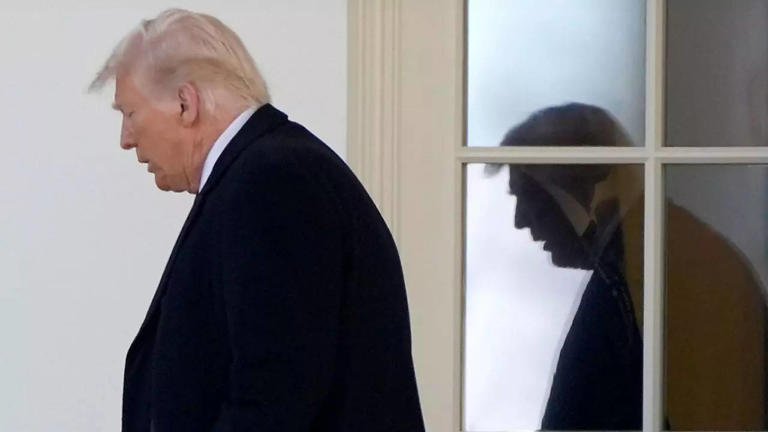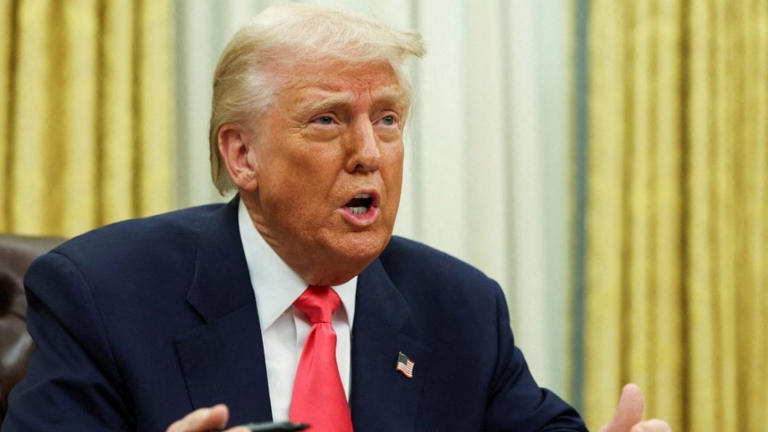Trump Refuses to Rule Out Recession, Calls Economy a ‘Transition’ Amid Market Turmoil
Washington, D.C.: As concerns grow over a potential Trump recession 2025, President Donald Trump on Sunday refused to rule out an economic downturn, offering only vague reassurances about the country’s financial future.
During an interview with Fox News, Trump was directly asked whether the US economy would enter a recession in 2025. Instead of providing a clear answer, he sidestepped the question.
“I hate to predict things like that,” Trump responded. “There is a period of transition because what we’re doing is very big—we’re bringing wealth back to America. It takes a little time.”
Despite Trump’s optimistic tone, economic warning signs are becoming harder to ignore, fueling fears of a Trump recession 2025.
✔ The stock market just experienced its worst week since the November election, rattling investors.
✔ Consumer confidence is falling, as rising prices linked to Trump’s new tariffs on Canada, Mexico, and China weigh on household spending.
✔ Mass layoffs continue across industries, with billionaire Elon Musk overseeing widespread government job cuts.
When pressed again about the risk of a Trump recession 2025, the president remained noncommittal.
“Who knows?” he said.
Economic Indicators Point to Trouble Ahead
The Atlanta Federal Reserve has projected a 2.4% contraction in GDP growth for the first quarter of 2025. If this forecast holds, it would mark the worst economic performance since the COVID-19 pandemic in 2020.
A recession is typically defined as two consecutive quarters of negative GDP growth. While one bad quarter doesn’t guarantee a full-blown Trump recession 2025, a shrinking economy combined with falling consumer confidence and stock market instability could push the US toward an economic slump.
Investment banks are already adjusting their outlooks:
📊 Goldman Sachs has raised its recession probability from 15% to 20% over the next 12 months.
📊 Morgan Stanley has revised its US growth forecast downward, warning of weaker-than-expected economic momentum.
With more financial institutions lowering their growth projections, concerns about a Trump recession 2025 are mounting.
Trump’s Trade Policy: A Gamble on Tariffs
One of the biggest factors driving economic uncertainty is Trump’s aggressive tariff strategy, which some experts warn could trigger a Trump recession 2025.
✔ New tariffs on Canada, Mexico, and China have raised costs for US businesses and consumers.
✔ Supply chain disruptions have pushed prices higher, further straining household budgets.
✔ Many analysts fear that Trump’s tariff policies could prolong economic instability rather than improve US competitiveness.
Trump’s Chief Economic Advisor, Kevin Hassett, suggested that these tariffs might become permanent, depending on whether foreign governments comply with US demands.
“If they fail to meet our expectations, the tariffs could remain as part of a new economic equilibrium,” Hassett said.
However, economic experts remain skeptical. While Trump insists that his policies will “bring wealth back to America,” many financial analysts argue that rising costs and weaker global trade relations could drag the US economy into a prolonged Trump recession 2025.
Mass Layoffs and Consumer Fears
Beyond tariffs, job losses are adding to economic anxiety, fueling concerns about a Trump recession 2025.
✔ Widespread layoffs have hit multiple sectors, including manufacturing, government agencies, and tech.
✔ Billionaire Elon Musk has overseen major government job cuts, further adding to uncertainty.
✔ Household spending has slowed, as inflation and higher interest rates weigh on consumer confidence.
A sharp drop in consumer spending is often an early indicator of a looming Trump recession 2025.
If Americans continue to cut back on purchases, businesses may struggle to maintain revenue, leading to more layoffs and an even deeper economic slowdown.
The Last US Recession: A Stark Reminder
The most recent US recession occurred in early 2020, when the COVID-19 pandemic triggered:
🔹 Mass unemployment, with millions losing their jobs.
🔹 A historic stock market crash, forcing the Federal Reserve to intervene.
🔹 Trillions in stimulus spending to stabilize the economy.
While the Trump recession 2025 outlook is different from 2020, the warning signs are familiar:
✔ A struggling stock market.
✔ Weak GDP growth projections.
✔ Falling consumer confidence.
✔ Rising unemployment.
The question remains: Will Trump’s economic policies stabilize the economy, or will they push the US into another Trump recession 2025?
Trump’s Economic Strategy: Will It Pay Off or Backfire?
As Trump attempts to reassure Americans, economic experts continue to sound the alarm about a potential Trump recession 2025.
🔹 Will tariffs truly boost American industries, or will they prolong economic uncertainty?
🔹 Can new job creation offset the mass layoffs currently happening?
🔹 Will the Federal Reserve be forced to intervene if growth slows further?
At the moment, Trump remains defiant, insisting that the economy is merely going through a transition phase.
“We’re bringing wealth back to America,” he reiterated.
But for millions of Americans concerned about job security and rising prices, vague assurances may not be enough.
Is a Trump Recession 2025 Inevitable?
Despite Trump’s confidence, economic uncertainty continues to grow.
✔ Stock market struggles, declining consumer confidence, and trade tensions are all signs of potential trouble.
✔ The Federal Reserve’s GDP projections suggest that the economy may already be contracting.
✔ Investment banks are increasing their recession forecasts.
With so many uncertain variables, Trump’s “transition phase” could turn into a full-blown Trump recession 2025 if his policies fail to produce the promised results.
For now, Trump refuses to commit to an answer.
“Who knows?” he said when asked about a recession.
One thing, however, is certain: The US economy is at a crossroads, and the coming months will determine whether Trump’s strategy succeeds—or leads the country into its next financial downturn. 🚨📉







